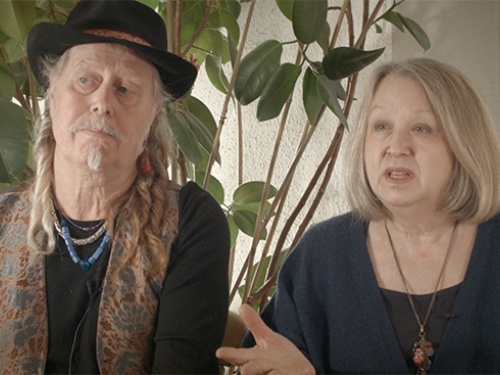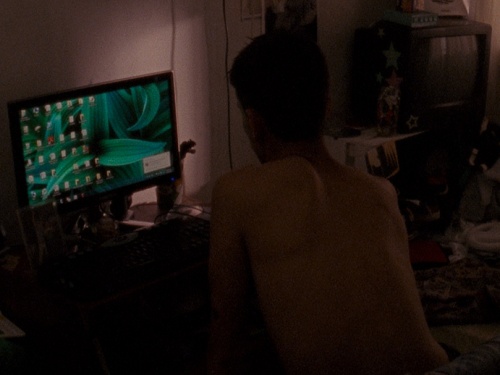Student Forum Interview: Filmmaker Sarah Turner
Julie Solovyeva, member of the ICA Student Forum, and a PhD candidate at The Courtauld Institute, interviewed filmmaker Sarah Turner, following her discussion with James MacKay as part of our Culture Now series, and the screening of her film Ecology on September 7.
Sarah Turner is a filmmaker who works with an incisive yet tender, poetic touch that filters through the darkness of the cinema in an enveloping penetrating embrace. Her film Ecology screened at the ICA on Friday. It was an early afternoon of our rare indian summer, when foolish wandering sunrays play games across our memory panes. The cinema filled for the matinee, some lost lazy souls wandering in at various times throughout the screening; a moment of respite, of silent surrender to the departing summer, to moments past. We sat resolutely mourning and revelling in the passing moment.
Ecology is a lyrical ode to the preservation of our limited moments, to the most precious resource of all – time. Its pensive, at times discordant voices imprint themselves into the subconscious. Watching Turner’s film evokes a liminal experience. It is like shifting between realities and dreaming, materializing the fleeting material of time. At the end of it one is most physically affected; flickering images, words, light, sound, and silence fill the body.
Is that what contemporary feminist filmmaking is about? The energy of human experience? Sarah Turner discusses the reification of social spaces, process-based filmmaking and the importance of a collective experience. A new sequence of her film Perestroika will be screened at no.w.here this autumn.
Julie Solovyeva: One of my questions that came up during your Culture Now talk with James Mackay was regarding the cinema as a social space versus the museum as social space, or the art world as a social space. I was wondering what your thoughts are about what constitutes the difference?
Sarah Turner: You’re picking up what I was saying earlier. I guess, even now, I think it is more a democratized space. Even with the new culture of pop-ups, which are quite democratized. They rely on a very particular kind of niche network, and then on the other side of the spectrum, you have the more commodified world of the gallery and the serious money, which is very alienating. You know, I think people find the money more alienating than the ideas, oddly, because actually some really good art is very difficult and the ideas are not particularly digestible, metabolisable. They can take some work, but it isn’t the labour of the work, it’s actually the alienation of that space. And there is something about the cinema. Maybe it’s really simply that you are having a collective experience. It might be meaningful that you are having a collective experience in the dark, but you are certainly having a collective experience. It is the temporality of the cinema, which is absolutely fundamental – that which you cannot undo.
That film is designed to be screened in any order, so those three sequences are determined by the exhibitors. If I play it from a Blu-ray or a DVD, I did one version of the film, but in the DVD version of the film, the sequences are interchangeable. And the thing about that is that we revisit the temporality of our structural understanding of narrative experience. So yes, it is a democratized space where you are having a temporally-bound collective experience. Of course, every individual is going to have a completely different experience within that experience but it is a shared moment.
JS: But as a shared moment of experiencing various ideas that may come up in the process of watching a film, do you not find the cinema limiting? What happens after? This isn’t something that is talked about often. Is there another social space for the public to synthesise and metabolise these ideas, because the cinema does not really provide this? Or very rarely…
ST: Except for the ICA Bar or the Filmmakers’ Co-op, but you don’t do that in a gallery either, you do not sit down and metabolise.
JS: I guess the cinema and galleries can only inspire the public to go and have conversations of their own. My other question is about your process and how it has evolved over the years, how your involvement with the moving image has changed from the collaborative way of learning theory and history to now working by yourself, or with yourself in your studio, internalizing all this? And this may perhaps have to do with how you tie your process to that of making music or writing, because the experience of a writer is very internalized. I can see that in your films. Perhaps you can tell me a bit about that.
ST: A big part of my work is writing and, yes, it is a very very internal process. It requires utter immersion and absorption in order to sustain what is a very precarious reality in the making of…and that’s why I think film for me is compelling, because somehow this process of mediation is somehow externalized even if that process is very removed from the internal space and then what you have is another form of writing, when you are editing, except that you are negotiating more elements. You are not just negotiating language anymore, you are negotiating time, rhythm, colour, sound, or silence. It’s choreography of a number of more complex elements, as well as spoken language. And then the conversation starts, the elements start to speak to each other and they create their own rhythm and internal structures. Really, editing is a lot more sculptural and it’s the process of uncovering those elements, and just negotiating quite sculpturally those elements and their groupings around repetition and variation.
But did you mean equally the more social space from the inside? It differs from project to project, really. Perestroika, obviously, quite literally just involves me and Matthew [Walter, DP] and we went on a trip with my partner at the time and two other people. And you can see the elements of photography. We were shooting on still cameras and HD on a number of cameras as well. But all of the media was bound to that finite period of the five days, four days on the train, and four days in Siberia, and then obviously the archive from 20 years ago. I limited all of the media I used…it was only that diegetic media or it came from an emotional diegesis. Perestroika, I wrote in response to the experience.
With Ecology, again, it was a response to an experience, a response to an experience of a particular landscape, which is a writer’s retreat and it is ecologically responsible, solar powered from crap old solar panels. Because it is on the top of a mountain, the only water that is there comes from rain being contained, filtered and recycled. Drinking water is different, so all of the water you are using, the water you are flushing the toilets with, and the water you are washing up in is rainwater. So water becomes this precious resource you can deplete, you have to totally respect it. So having had that experience there, I thought how interesting it would be to transplant a kind of suburban working class family into that landscape but the other thing is that all the work comes from an awful lot of research, so the different paradigms of research that I thought through at the time are there. It’s completely process-based filmmaking, in a sense that having gone through the process of writing feature-film scripts, which is staging narratives, staging events that will be performed by actors, and everything is sublimated to performance. The elements exist only within the shoot. It is antithetical to that way of working.
JS: So the work you are doing now, is it different from what you were doing at Slade?
ST: Well the short films I made were not dissimilar. If there was a governing aesthetic of my work it would be the space between abstraction and narration and working around affect, that has continuously been the governing aesthetic.
Sarah Turner is a founder member of Hysteriography, a group of British female filmmakers, writers and curators, and director of Fine Art at University of Kent. Her feature films Ecology (2007) and Perestroika (2009) are characterized by explorations of technologies, experimental approaches to writing and an engagement with experiences of narrative, immersion and embodiment within the long form film. Sarah has also curated projects including Hygiene and Hysteria: The body desired and the body debased; touring programmes of Artists film and touring programmes of Artists film and video for the Arts Council of England, as well as programmes for Tate Gallery and the National Film Theatre.
This article is posted in: Blog, Events, Film, Student Forum
Tagged with: Feminism, Film, interview, Sarah Turner, Student Forum





